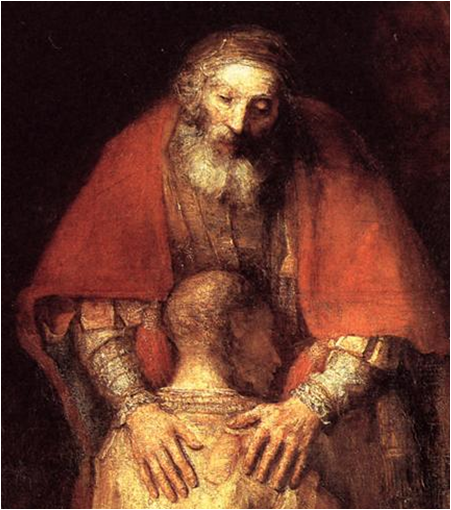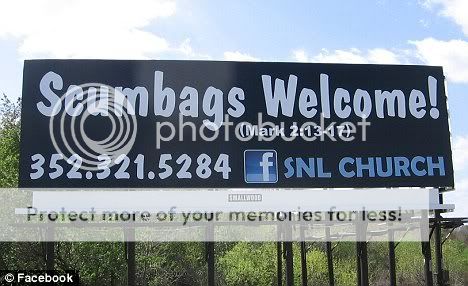Mark 2:14-17
As He passed by, He saw Levi the son
of Alphaeus sitting in the tax booth, and He said to him, "Follow
Me!" And he got up and followed Him. And it happened that He was reclining
at the table in his house, and
many tax collectors and sinners were dining with Jesus and His disciples; for
there were many of them, and they were following Him. When the scribes of the
Pharisees saw that He was eating with the sinners and tax collectors, they said
to His disciples, "Why is He eating and drinking with tax collectors and
sinners?" And hearing this,
Jesus said to them, "It is not
those who are healthy who need a physician, but those who are sick; I did not
come to call the righteous, but sinners."
Luke 15:1-32
Now all the tax collectors and the sinners were coming near Him to listen
to Him. Both the Pharisees and the scribes began to grumble, saying, "This man receives sinners and
eats with them." So He told them this parable, saying,
“What man among you, if he has a hundred sheep and has lost one of them,
does not leave the ninety-nine in the open pasture and go after the one which
is lost until he finds it? When he has found it, he lays it on his shoulders,
rejoicing. And when he comes home, he calls together his friends and his
neighbors, saying to them, 'Rejoice with me, for I have found my sheep which
was lost!' I tell you that in the same way, there will be more joy in heaven over one sinner
who repents than over ninety-nine righteous persons who need no repentance.”
Luke 15:11-32
A man had two sons. The younger of them said to his father, 'Father, give
me the share of the estate that falls to me.' So he divided his wealth between
them. And not many days later, the younger son gathered everything together and
went on a journey into a distant country, and there he squandered his estate
with loose living. Now when he had spent everything, a severe famine occurred
in that country, and he began to be impoverished. So he went and hired himself
out to one of the citizens of that country, and he sent him into his fields to
feed swine. And he would have gladly filled his stomach with the pods that the
swine were eating, and no one was giving anything
to him. But when he came to his senses, he said, 'How many of my
father's hired men have more than enough bread, but I am dying here with
hunger! 'I will get up and go to my father, and will say to him, "Father,
I have sinned against heaven, and in your sight; I am no longer worthy to be
called your son; make me as one of your hired men."'
"So he got up and came to his father. But while he was still a long
way off, his father saw him and felt compassion for him, and ran and embraced him and kissed him. And the son
said to him, 'Father, I have sinned against heaven and in your sight; I am no
longer worthy to be called your son.' But the father said to his slaves,
'Quickly bring out the best robe and put it on him, and put a ring on his hand
and sandals on his feet; and bring the fattened calf, kill it, and let us eat
and celebrate; for this son of mine was dead and has come to life again; he was
lost and has been found.' And they began to celebrate.
"Now his older son was in the field, and when he came and approached
the house, he heard music and dancing. And he summoned one of the servants and began inquiring what these things
could be. And he said to him, 'Your brother has come, and your father has
killed the fattened calf because he has received him back safe and sound.' But
he became angry and was not willing to go in; and his father came out and began pleading with him. But he
answered and said to his father, 'Look! For so many years I have been serving
you and I have never neglected a command of yours; and yet you have never given me a young goat, so that I might
celebrate with my friends; but when this son of yours came, who has devoured
your wealth with prostitutes, you killed the fattened calf for him.' And he
said to him, 'Son, you have always been with me, and all that is mine is yours.
But we had to celebrate and rejoice, for this brother of yours was dead and has begun to live, and was lost and has been found.'"
But what do you think? A man had two sons, and he came to the first and
said, 'Son, go work today in the vineyard.' And he answered, 'I will not'; but
afterward he regretted it and went. The man came to the second and said the
same thing; and he answered, 'I will,
sir'; but he did not go. Which of the two did the will of his father?
Truly I say to you that the tax collectors and prostitutes will get into the kingdom of God
Luke 17:3-4
If your brother sins, rebuke him; and if he repents, forgive him. And if he
sins against you seven times a day, and returns to you seven times, saying, 'I
repent,' forgive him."
Matthew 18:15-35
If your brother sins, go and show him his fault in private; if he listens
to you, you have won your brother. But if he does not listen to you, take one or two more with
you, so that BY THE MOUTH OF TWO OR THREE WITNESSES EVERY FACT MAY BE
CONFIRMED. If he refuses to listen to them, tell it to the church; and if he
refuses to listen even to the church, let him be to you as a Gentile and a tax
collector…Then Peter came and said to Him, "Lord, how often shall my
brother sin against me and I forgive him? Up to seven times?" Jesus said
to him, "I do not say to you, up to seven times, but up to seventy times
seven.
Luke 19:10
For the Son of Man has come to seek and to save that which was lost.

















